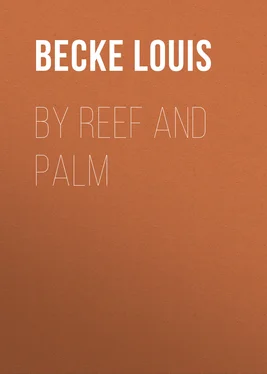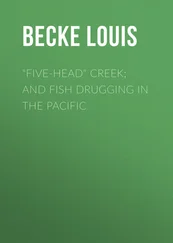Louis Becke - By Reef and Palm
Здесь есть возможность читать онлайн «Louis Becke - By Reef and Palm» — ознакомительный отрывок электронной книги совершенно бесплатно, а после прочтения отрывка купить полную версию. В некоторых случаях можно слушать аудио, скачать через торрент в формате fb2 и присутствует краткое содержание. Жанр: foreign_prose, literature_19, foreign_antique, на английском языке. Описание произведения, (предисловие) а так же отзывы посетителей доступны на портале библиотеки ЛибКат.
- Название:By Reef and Palm
- Автор:
- Жанр:
- Год:неизвестен
- ISBN:нет данных
- Рейтинг книги:5 / 5. Голосов: 1
-
Избранное:Добавить в избранное
- Отзывы:
-
Ваша оценка:
- 100
- 1
- 2
- 3
- 4
- 5
By Reef and Palm: краткое содержание, описание и аннотация
Предлагаем к чтению аннотацию, описание, краткое содержание или предисловие (зависит от того, что написал сам автор книги «By Reef and Palm»). Если вы не нашли необходимую информацию о книге — напишите в комментариях, мы постараемся отыскать её.
By Reef and Palm — читать онлайн ознакомительный отрывок
Ниже представлен текст книги, разбитый по страницам. Система сохранения места последней прочитанной страницы, позволяет с удобством читать онлайн бесплатно книгу «By Reef and Palm», без необходимости каждый раз заново искать на чём Вы остановились. Поставьте закладку, и сможете в любой момент перейти на страницу, на которой закончили чтение.
Интервал:
Закладка:
And so Malia, dressed as a native girl, with painted cheeks and bare bosom, walked demurely up from the boat to the purchaser of her sixteen-years'-old beauty, who, with arms folded across his broad chest, stood in the middle of the path that led from the beach to his door. And within, with set teeth and a knife in the bosom of her blouse bodice, Sera panted with the lust of Hate and Revenge.
The bulky form of O'Shea darkened the door-way. "Sera," he called in English, with a mocking, insulting inflection in his voice, "come here and welcome my new wife!"
Sera came, walking slowly, with a smile on her lips, and, holding out her left hand to Malia, said in the native language, "Welcome!"
"Why," said O'Shea, with mocking jocularity, "that's a left-handed welcome, Sera."
"Aye," said the girl with the White Man's blood, "my right hand is for this"—and the knife sank home into Malia's yellow bosom. "A cold bosom for you to-night, Macy O'Shea," she laughed, as the value of a tun of oil and a bag of Chilian dollars gasped out its life upon the matted floor.
II
The native drum was beating. As the blood-quickening boom reverberated through the village, the natives came out from their huts and gathered around the House of the Old Men, where, with bound hands and feet, Sera, the White Man's wife, sat, with her back to one of the centre-posts. And opposite her, sitting like a native on a mat of KAPAU, was the burly figure of O'Shea, with the demon of disappointed passion eating away his reason, and a mist of blood swimming before his eyes.
The people all detested her, especially the soft-voiced, slender-framed women. In that one thing savages resemble Christians—the deadly hatred with which some women hate those of their sex whom they know to be better and more pure than themselves. So the matter was decided quickly. Mesi—so they called O'Shea—should have justice. If he thought death, let it be death for this woman who had let out the blood of his new wife. Only one man, Loloku the Boar Hunter, raised his voice for her, because Sera had cured him of a bad wound when his leg had been torn open by the tusk of a wild boar. But the dull glare from the eyes of O'Shea fell on him, and he said no more. Then at a sign from the old men the people rose from the mats, and two unbound the cords of AFA from the girl, and led her out into the square, and looked at O'Shea.
"Take her to the boat," he said.
Ristow's boat had been hauled up, turned over, and covered with the rough mats called KAPAU to keep off the heat of the sun. With staggering feet, but undaunted heart, the girl Sera was led down. Only once she turned her head and looked back. Perhaps Loloku would try again. Then, as they came to the boat, a young girl, at a sign from O'Shea, took off the loose blouse, and they placed her, face downwards, across the bilge of the boat, and two pair of small, eager, brown hands each seized one of hers and dragged the white, rounded arms well over the keel of the boat. O'Shea walked round to that side, drawing through his hands the long, heavy, and serrated tail of the FAI—the gigantic stinging-ray of Oceana. He would have liked to wield it himself, but then he would have missed part of his revenge—he could not have seen her face. So he gave it to a native, and watched, with the smile of a fiend, the white back turn black and then into bloody red as it was cut to pieces with the tail of the FAI.
The sight of the inanimate thing that had given no sign of its agony beyond the shudderings and twitchings of torn and mutilated flesh was, perhaps, disappointing to the tiger who stood and watched the dark stream that flowed down on both sides of the boat. Loloku touched his arm—"Mesi, stay thy hand. She is dead else."
"Ah," said O'Shea, "that would be a pity; for with one hand shall she live to plant taro."
And, hatchet in hand, he walked in between the two brown women who held her hands. They moved aside and let go. Then O'Shea swung his arm; the blade of the hatchet struck into the planking, and the right hand of Sera fell on the sand.
A man put his arms around her, and lifted her off the boat. He placed his hand on the blood-stained bosom and looked at Macy O'Shea.
"E MATE! [Dead!]" he said.
THE RANGERS OF THE TIA KAU
Between Nanomea and Nanomaga—two of the Ellice Group—but within a few miles of the latter, is an extensive submerged shoal, on the charts called the Grand Cocal Reef, but by the people of the two islands known as Tia Kau (The Reef). On the shallowest part there are from four to ten fathoms of water, and here in heavy weather the sea breaks. The British cruiser BASILISK, about 1870, sought for the reef, but reported it as non-existent. Yet the Tia Kati is well known to many a Yankee whaler and trading schooner, and is a favourite fishing-ground of the people of Nanomaga—when the sharks give them a chance.
One night Atupa, Chief of Nanomaga, caused a huge fire to be lit on the beach as a signal to the people of Nanomea that a MALAGA, or party of voyagers, was coming over. Both islands are low—not more than fifteen feet above sea-level—and are distant from one another about thirty-eight miles. The following night the reflection of the answering fire on Nanomea was seen, and Atupa prepared to send away his people in seven canoes. They would start at sundown, so as to avoid paddling in the heat (the Nanomagans have no sailing canoes), and be guided to Nanomea, which they expected to reach early in the morning, by the far distant glare of the great fires of coconut and pandanus leaves kindled at intervals of a few hours. About seventy people were to go, and all that day the little village busied itself in preparing for the Nanomeans gifts of foods—cooked PURAKA, fowls, pigs, and flying-fish.
Atupa, the heathen chief, was troubled in his mind in those days of August 1872. The JOHN WILLIAMS had touched at the island and landed a Samoan missionary, who had pressed him to accept Christianity. Atupa, dreading a disturbing element in his little community, had, at first, declined; but the ship had come again, and the chief having consented to try the new religion, a teacher landed. But since then he and his sub-chiefs had consulted the oracle, and had been told that the shades of Maumau Tahori and Foilagi, their deified ancestors, had answered that the new religion was unacceptable to them, and that the Samoan teacher must be killed or sent away. And for this was Atupa sending off some of his people to Nanomea with gifts of goodwill to the chiefs to beseech them to consult their oracles also, so that the two islands might take concerted action against this new foreign god, whose priests said that all men were equal, that all were bad, and He and His Son alone good.
The night was calm when the seven canoes set out. Forty men and thirty women and children were in the party, and the craft were too deeply laden for any but the smoothest sea. On the AMA (outrigger) of each canoe were the baskets of food and bundles of mats for their hosts, and seated on these were the children, while the women sat with the men and helped them to paddle. Two hours' quick paddling brought them to the shoal-water of Tia Kau, and at the same moment they saw to the N.W. the sky-glare of the first guiding fire.
It was then that the people in the first canoe, wherein was Palu, the daughter of Atupa, called out to those behind to prepare their ASU (balers), as a heavy squall was coming down from the eastward. Then Laheu, an old warrior in another canoe, cried out that they should return on their track a little and get into deep water; "for," said he, "if we swamp, away from Tia Kau, it is but a little thing, but here—" and he clasped his hands rapidly together and then tore them apart. They knew what he meant—the sharks that, at night-time forsaking the deep waters, patrolled in droves of thousands the shallow waters of the reef to devour the turtle and the schools of TAFAU ULI and other fish. In quick, alarmed silence the people headed back, but even then the first fierce squall struck them, and some of the frail canoes began to fill at once. "I MATAGI! I MATAGI! (head to the wind)" a man called out; "head to the wind, or we perish! 'Tis but a puff and it is gone."
Читать дальшеИнтервал:
Закладка:
Похожие книги на «By Reef and Palm»
Представляем Вашему вниманию похожие книги на «By Reef and Palm» списком для выбора. Мы отобрали схожую по названию и смыслу литературу в надежде предоставить читателям больше вариантов отыскать новые, интересные, ещё непрочитанные произведения.
Обсуждение, отзывы о книге «By Reef and Palm» и просто собственные мнения читателей. Оставьте ваши комментарии, напишите, что Вы думаете о произведении, его смысле или главных героях. Укажите что конкретно понравилось, а что нет, и почему Вы так считаете.












